- huntsville@aaanimalcontrol.com
Call 24/7 for a free quote:
256-517-7870
Huntsville AL Wildlife Information
Alabama Wildlife Commission: 334-242-3469
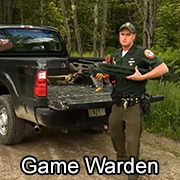 If you have any questions about the wildlife of Huntsville, you can contact the Alabama Wildlife Commission,
sometimes called the Alabama Fish & Wildlife Agency. Alabama game wardens address many wildlife management matters, from hunting licenses, to poaching, endangered species, and Huntsville wildlife management.
They deal with wild animals outside the range of a pest control company, such as cougars or bears. If you have a problem with nuisance wildlife in Huntsville like squirrels, snakes, bats, or raccoons,
the state agency is very unlikely to help. You need to hire a private company (here are their prices) such as Professional Wildlife Services at 256-517-7870.
If you have any questions about the wildlife of Huntsville, you can contact the Alabama Wildlife Commission,
sometimes called the Alabama Fish & Wildlife Agency. Alabama game wardens address many wildlife management matters, from hunting licenses, to poaching, endangered species, and Huntsville wildlife management.
They deal with wild animals outside the range of a pest control company, such as cougars or bears. If you have a problem with nuisance wildlife in Huntsville like squirrels, snakes, bats, or raccoons,
the state agency is very unlikely to help. You need to hire a private company (here are their prices) such as Professional Wildlife Services at 256-517-7870.
I also have listed several sources for free Huntsville wildlife help. One example, if you've found an injured animal or lost baby bird or other baby animal is the Huntsville Wildlife Rehabilitation Clinic: 256-723-7890 Or just read below for more info about the wild animals of Huntsville.
Types of Wildlife and Animal Problems in Huntsville, AL
State bird: Yellowhammer, wild turkey
State mammal: American black bear
State reptile: Alabama red-bellied turtle
State amphibian: Red Hills salamander
State fish: Largemouth bass, fighting tarpon
State insect: Monarch butterfly
Alabama is called the Heart of Dixie, and its central location in the south makes it a warm, humid state. Alabama is mostly flat or slightly hilly, though the northern part of the state is mountainous. Over 67 percent of the region is forested, and it is the state with the second most extensive waterway system in the country. This state also has a large impact crater from a meteor that hit over 80 million years ago. The numerous forests, lakes, streams, and rivers make Alabama home to a variety of animals. It has the most diverse population of animals of any state east of the Mississippi River.
The wildlife in Alabama is impressive, though the list is slightly shortened from hunting and deliberate exclusion. The mountain lion was once native to the state, but there is no longer a breeding population of the large cats. Critters at the top of the food chain are black bears, and coyotes. Foxes and bobcats come in second for the carnivores.
Red wolves once roamed the forested regions through most of the state, but the species was declared extinct in the region back in the 1920's.
There are two species of skunks Alabama. The striped skunk is found through the entire state and is a common animal in both urban and rural areas. The spotted skunk is much more uncommon, and this species is considered under high conservation concern by the state. Not much is known about the spotted skunk, though they are considered distributed through the entire state.
Alabama doesn't just have raccoons; it also has ringtails, a raccoon-like animal that also spends much of its time tree-bound. Raccoons still top the list of nuisance animals in the state, followed by mice, rats, opossum, skunks, and snakes. This state's warm climate is perfect for reptiles.
Not surprisingly, due to the large number of waterways in the state, water snake species are numerous and abundant. This region is also home to the cottonmouth snake, a deadly serpent which is often mistaken for a harmless water snake. Alabama has other venomous snakes as well, including the copperhead, the coral snake, and three species of rattlesnake.
Also native to the waters of Alabama are alligators. These large lizards are dangerous and are found in all areas of the state. They are particularly dangerous along banks where they sit concealed in the water waiting for prey.
If you need a professional wildlife trapper in Huntsville, AL call Professional Wildlife Services: 256-517-7870

Huntsville Raccoons:
This masked animal is fairly common in Huntsville, AL. They frequently raid trash cans and steal pet food. They also often choose to live in the attic or chimney of your home. One of Alabama's beautiful animals, but often a nuisance. We offer Huntsville raccoon removal.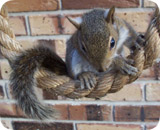
Huntsville Squirrels:
Squirrels are often a pest in Huntsville. They love to live in an attic, and will chew on wood or electrical wires. They are agile creatures, and live throughout the state of Alabama. Call Professional Wildlife Services if you need squirrel removal in Huntsville.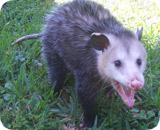
Huntsville Opossum:
You may spot this animal in Huntsville at night time, perhaps rooting through your garbage. This opportunistic animal will take your pet's food or live under your porch. The possum is a great Alabama survivor, and not all that ugly.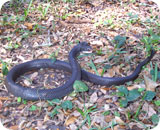
Huntsville Snakes:
There are many species of snakes in Huntsville, but few are venomous. If you need help identifying snakes of Alabama, browse this site or give us a call at 256-517-7870. We at Professional Wildlife Services can provide Huntsville snake control any time you need us.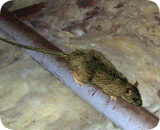
Huntsville Rat Control:
The Norway Rat, Roof Rat, and House Mouse inhabit most areas of North America that people inhabit, including most Alabama cities. They contaminate food and love to live in the walls or attic of a home. Professional Wildlife Services can get rid of them once and for all.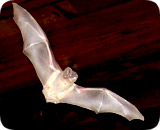
Huntsville Bats:
Bats are special animals, and found throughout Alabama. They are good creatures and eat a lot of insects, but if you have an infestation of bats in your home or building, you can give us a call for professional Huntsville bat removal and control.REPORT WILDLIFE ISSUES: (256) 532-1519
To report a dead animal on the road, an injured bird, a lost baby squirrel, a dangerous bear, or anything like that, call animal services at (256) 532-1519
If they can't help, call the Alabama Wildlife Commission at (256) 532-1519. You can also call your local sheriff department at (256) 532-1519 - they often deal with public wildlife issues.
We are experts with all kinds of AL wildlife and are familiar with the wild animals native to Huntsville. If you need Huntsville pigeon control, geese or other bird removal, we can help. We are experts with skunks and
skunk problems, digging animals such as moles, armadillos, & groundhogs, and we offer Alabama beaver control and removal. Professional Wildlife Services also provides dead animal removal services. 256-517-7870
We offer the following services:
- Removal of nuisance wildlife or wildlife causing property damage
- Damage repair
- Dead animal removal
- Consultation on proactive wildlife measures/issues
- Service Area: All of Madison County (Huntsville, Madison, Harvest, Triana, Gurley)
- Wildlife Removed: Gray Squirrels, Flying Squirrels, Bats, Skunks, Beaver, Armadillos, Snakes, Raccoons, Opossums, Birds, Chip Monks, Moles, Fox, Coyotes and Dead Animal Removal.
- Service is guaranteed and insured.
- We also offer professional gutter cleaning services!
Huntsville Wildlife Tip
Rodent Peppermint Repellent: Does It Work? - Anyone who has a rodent infestation in their home will probably have discovered that there are hundreds of so-called guaranteed methods of dealing with them. One of these, which currently appear to be very popular, is using peppermint to deter, or evict, your rodents. The recommendation usually involves leaving peppermint leaves, or plants, around the area the rodents are living or even using peppermint oil as a spray deterrent.
In fact, using peppermint in any form is an expensive exercise since rodents have no objection to the smell - and are likely to just go around the area even if they don't like it. Rodents are intelligent, determined creatures that are very difficult to remove once they have found a place to live that meets all their requirements for food, safety and food sources. The one advantage of using peppermint is that it is a useful way of masking the terrible smell the rodent infestation will be creating as the rodents spray their feces and urine around your property. If you have rodents in your home, it is essential that you get rid of them as quickly as possible - the amount of damage they can cause to the infrastructure of your building may be expensive.
Huntsville, AL Wildlife News Clip:
Huntsville Whitetail Deer Hunters Lead in Kills
Huntsville is not named Hunstville for no reason. The people here hunt, and they hunt a lot. Deer hunter Clay Snickerson can lay claim to being a national champion of sorts, part of a team that racked up the highest whitetail deer harvest numbers in the nation for the 2003-2004 hunting season.
Hunters in Huntsville, Alabama bagged 4,535,000 deer last year, according to state estimates.
Alabama has a deer herd estimated at 1.7 million animals. Deer can't be rounded up and counted, so that figure is arrived at by a formula using harvest numbers from hunters, field studies by state officials and limited counting of deer in selected areas of the state.
It wasn't always this way. Up until 60 years ago, there were so few deer in the state, only a few counties had a hunting season. An aggressive stocking program in the late 1950's and early 1960's led to the most abundant deer herd in the nation.
The success has been too much of a good thing. In parts of Alabama, particularly in the Black Belt region, the deer population is stretching the capacity of the land and endangering more and more drivers. "I know we bag a lot of deer in this state but there are still places where we're approaching overpopulation," said Jeff Kurtzman of Huntsville. "Hunting is the best way to control the population. If we don't do it, mother nature will balance herself out through starvation and disease."
. "Of course, we don't condone the killing of animals unless it's absolutely necessary to the ecology of the land. Most of Huntsville's wildlife should not be hunted", said Kurtzman and Snickerson unanimously.
Critter Problem at Your House? Hire Professional Wildlife Services
Wildlife removal is not a free service.
 If you have a Huntsville wildlife problem and need help, call Professional Wildlife Services at 256-517-7870. They provide professional wildlife control for both residential & commercial customers in the
city of Huntsville. They offer custom Huntsville wildlife control
solutions for almost any type of wildlife problem, whether
it be the noises of squirrels running through the attic, a colony of bats living in a building, or
the destructive behavior of a raccoon, they have the experience and the tools to quickly and professionally
solve your wild animal problem in Madison County in Alabama. Check their prices, and for a consultation, give them a call at 256-517-7870
If you have a Huntsville wildlife problem and need help, call Professional Wildlife Services at 256-517-7870. They provide professional wildlife control for both residential & commercial customers in the
city of Huntsville. They offer custom Huntsville wildlife control
solutions for almost any type of wildlife problem, whether
it be the noises of squirrels running through the attic, a colony of bats living in a building, or
the destructive behavior of a raccoon, they have the experience and the tools to quickly and professionally
solve your wild animal problem in Madison County in Alabama. Check their prices, and for a consultation, give them a call at 256-517-7870
Huntsville, AL has a metropolitan population of about 350,000. It is located in Madison County. Huntsville is located in the Tennessee River Valley. Several mesas and large hills partially surround the city. Nearby towns include Ardmore, Athens, Decatur, Gurley, Hartselle, Harvest, Lacey's Spring, Madison, Meridianville, Monrovia, Moores Mill, Mooresville, New Hope, New Market, Normal, Old Monrovia, Owens Cross Roads, Priceville, Toney, & Triana. Our range includes the northern central portion of Alabama, including Madison County, Limestone County, and Morgan County, and including towns such as Madison, Capshaw, Meridianville, Ryland, Deposit, Maysville, Brownsboro, Paint Rock, Owens Crossroads, Lacey Spring, Mooresville, Triana and more, although we don't service all of these areas.
To learn more about us, visit our website at animalcontrolhuntsville.com.
You're still reading this page? We do not operate Huntsville wildlife rescue, or a Huntsville zoo or nature center, or Huntsville wildlife sanctuary or refuge for volunteers. We are a privately owned nuisance wildlife removal service company. If you need a pro in Huntsville to solve your problem for you, call Professional Wildlife Services: 256-517-7870 and they can help you with your Huntsville wildlife problem.








































